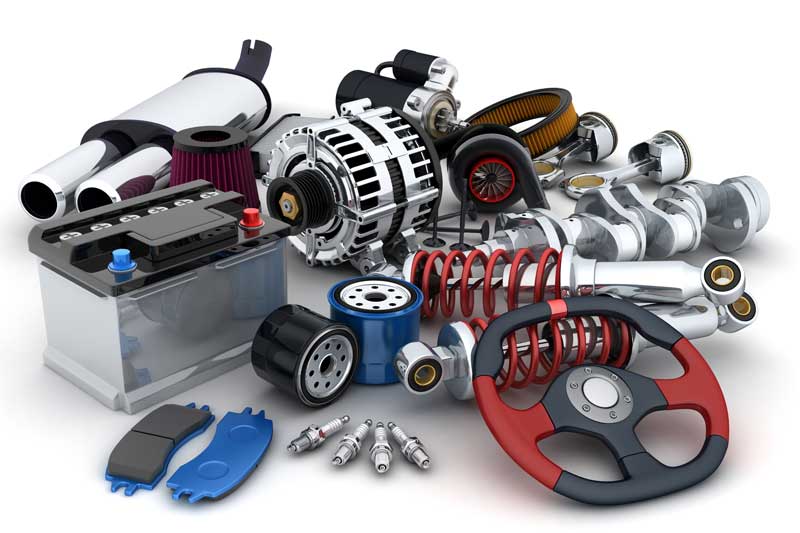The Government of Nigeria is poised to commence the manufacturing and supply of tyres, batteries, brake pads, and other automobile components to bolster the Nigerian automotive industry.
This policy initiative aims to enhance the local supply of components to the auto part markets by 40 per cent.
Doris Aniete, the Minister of Industry, Trade and Investment, disclosed this initiative during a ministerial sectoral briefing marking President Bola Tinubu’s first year in office, held on Tuesday in Abuja.
The programme will be implemented in collaboration with manufacturers, dealers, regulatory bodies, and other stakeholders in the automobile ecosystem.
For a considerable period, the Nigerian automobile industry has heavily relied on imports to meet local demands for vehicles and spare parts.
During a recent event, Luqman Mamudu, the Chairman of the West Africa Automotive Show, noted that Nigeria accounts for approximately 78.8 per cent of automotive components imported into West Africa.
According to him, about $6.2 billion is spent annually on importing automotive components and parts to the region, with Nigeria alone accounting for $4.2 billion.
However, during the briefing, the minister emphasized that the newly developed framework will prioritize collaboration among manufacturers, dealers, regulatory bodies, and other stakeholders in the automobile ecosystem.
This collaborative approach is believed to be essential for addressing challenges and unlocking investment potential.
The minister also highlighted the significance of local automotive components, underscoring the potential for significant foreign exchange savings through domestic production of parts.
She stated, “Steps are also being taken to unlock the potential opportunities inherent in the nation’s automotive sector. In collaboration with the National Automotive Design and Development Council – the anchor institution for the National Automotive Industry Development Plan and regulatory body for the automotive industry in Nigeria, the strategy and goal of the Ministry is to ensure that the Nigerian Automotive industry supplies 40 per cent of its components locally, comprising of glasses, tyres, batteries, brake pads, foam and seats, exhaust, electric cables etc.
“Towards this end, we have developed frameworks that emphasize the need for collaboration among manufacturers, dealers, regulatory bodies, and other players in the automobile ecosystem; because we believe that by working together, they can address challenges, streamline processes, and drive innovation. The automotive industry is set to sign off-take agreements amongst themselves and this is the beginning of history in Nigeria.”
She added, “With the MOUs and agreements, suppliers will be rest assured that car assemblers and manufacturers will buy their products. Assemblers will be guaranteed of their supply chain, quality and standards and consumers will be able to buy affordable brand new cars. This is how import substitution is done. We don’t have to use our FX to buy things we can produce. We don’t have to import if we can make it.”
Similarly, Aniete stated that the government had attracted the sum of $3.5 billion to develop a resurgence plan for optimized performance of the Nigerian Cotton, Textile and Apparel Industry in partnership with development partners and private sector players to unlock the sector.
“The ministry is developing a Resurgence Plan for Optimized Performance of the Nigerian Cotton, Textile and Apparel Industry in partnership with development partners and private sector players. We have attracted $3.5 billion investment capital to unlock this sector.”
According to the minister, Nigeria’s textile and apparel industry covers the entire clothing value chain and has a strong potential for growth due to the availability of cotton and the country’s large market-size represented by over 200 million inhabitants.
She said that the industry is one of the top contributors to the manufacturing sector of the economy, with the sector’s huge potential for employment creation, for both skilled and unskilled labour attracting foreign direct investment, and reducing poverty.
On revenue, the trade minister disclosed that the Lagos International Trade Fair Complex recorded significantly increased revenue to the federal government in the first quarter of 2024 amounting to 430 million naira against the revenue of 2023 was just 17 million naira.
The minister also disclosed that the ministry will host the Lagos International Trade Fair which was last hosted 14 years ago in 2010.
“With this massive increase and with the increasing facelift the ministry will be hosting the Lagos International Trade Fair, we are now set to host a popular Lagos International trade fair. This trade fair was last hosted 14 years ago in 2010 and this trade fair will reestablish our country as a market hub of West Africa.” she said.
According to her, the revival of this trade fair symbolizes the government’s unwavering commitment to reclaiming its position as a regional market powerhouse in West Africa.
Anite added that the resurgence of the Lagos International Trade Fair will not only reestablish Nigeria as a regional market hub but also amplify market linkages for manufacturers, suppliers, farmers, and traders nationwide.
She said the revitalization is poised to catalyze economic activities across various sectors, from tourism to manufacturing, while creating much-needed job opportunities and fortifying food security.
Concurrently, she said transformative reforms at the Nigerian Commodity Exchange aim to unlock equitable opportunities for farmers and miners in national and international markets as fruitful bilateral engagements with countries such as Qatar, the UK, India, and the UAE have further bolstered Nigeria’s market access and trade prospects.
To expedite export processes and mitigate rejections, Anite said the government is set to establish the one-stop export processing centres across geo-political zones to streamline operations with stringent regulations mandating exports against inward letters of credit aim to safeguard Nigeria’s natural resources while bolstering its currency and economy.

